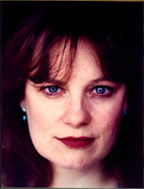
Lorenda Starfelt, who died of sarcoma, a rare form of cancer, in 2011 at the age of 56, was a producer whose efforts in theatre and film have resulted in a fascinating body of work. Stage productions such as the acclaimed and internationally recognized 1997 LA presentation of Euripides’ The Bacchae (nominated for three LA Weekly Theatre Awards); and 2003 staging of The Trojan Women (also by Euripides); Theatre of NOTE’s critically acclaimed presentation of The Persecution and Assassination of Jean-Paul Marat as Performed by the Inmates of the Asylum of Charenton Under the Direction of the Marquis de Sade; and a controversial multi-media production of Anthony Burgess’ A Clockwork Orange (nominated for three LA Weekly Theatre Awards, and winner of one); are all testament to her intelligence, drive and sense of cultural necessity.
Lorenda Starfelt’s film work is also noteworthy, with three feature-length documentaries, SING*ularity, a film about the internationally recognized OperaWorks training program; The Audacity of Democracy, which covered the PUMA movement’s advocacy of Hillary Clinton during the 2008 Presidential Primary, and a still in post-production film which examines, most ironically, the American health care system. Dramatic feature films include a film adaptation of The Bacchae; a modern adaptation of The Merchant of Venice entitled Shakespeare’s Merchant; Schooled, a dramatic feature about alternative education; the award winning romantic comedy The Watermelon; and the musical film Beginning Blue, now in production.
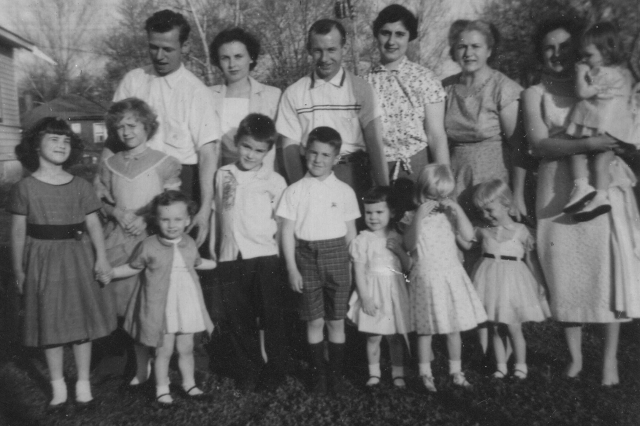
Lorenda Starfelt was born on January 11, 1955 in Belleville, IL. She and her brother Brad were raised, in the main, by their mother Phyllis, who worked as a nurse and suffered from mental illness. According to Starfelt, her mother hated girls and routinely beat her. When she began high school, an attempt was made to remove Lorenda from her mother’s care, but this effort was short-lived. While attending Belleville High School, Starfelt developed an interest in the theater, but circumstances prevented her from pursuing that passion until much later in life. During her senior year, Lorenda became pregnant. She gave the child – a daughter – up for adoption. Strikingly, the adoptive mother was Lorenda’s high school drama teacher. Several years after graduating, Lorenda met and married an engineer named William Starfelt. The difficult and short-lived marriage produced a son, Graham, who remained under his mother’s care after his parents’ eventual divorce.
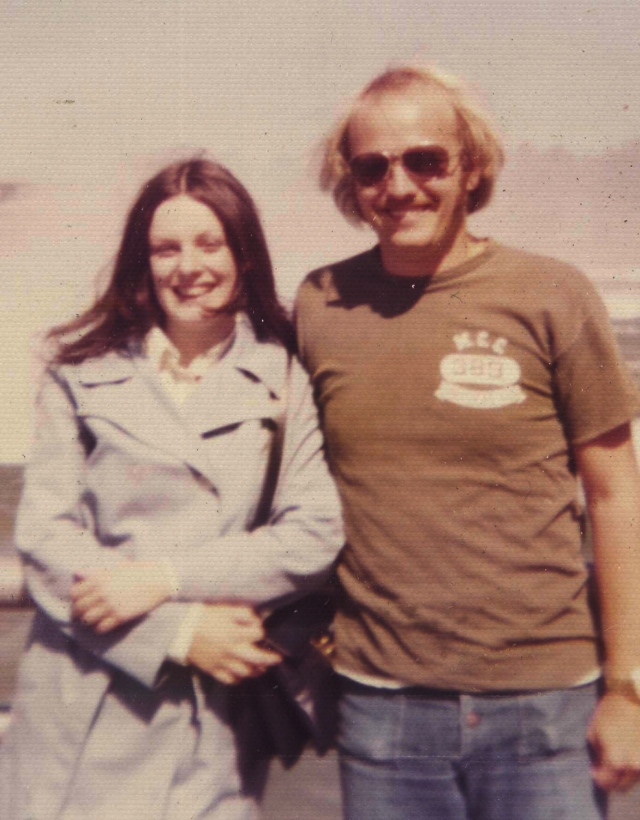
After a brief stay in Florida, mother and son moved to San Fransisco, where Lorenda quickly became involved in the political work of left-wing activist Tom Hayden. Starfelt eventually gravitated to Los Angeles, where she began work as an interior designer, while maintaining an interest in politics.
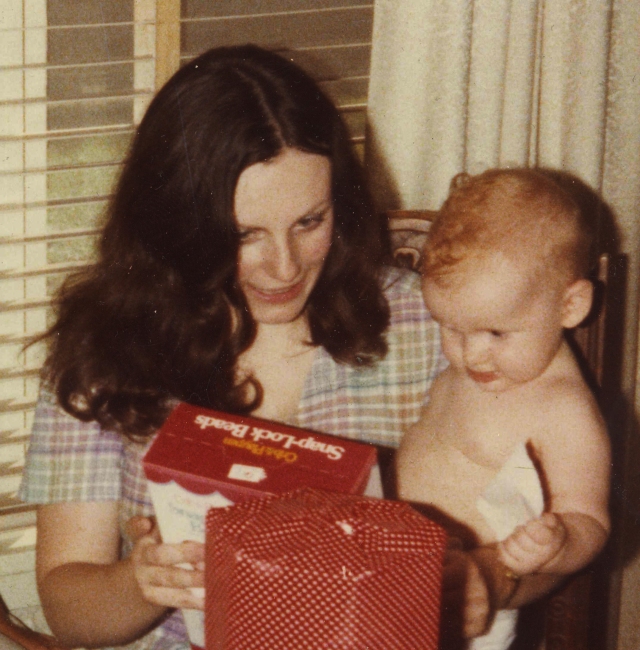
In the mid-nineties, she met a struggling filmmaker named Brad Mays. On the night of their first date – at a coffee shop in Studio City – a casual mention by Mays of his 1980 Baltimore stage production of Euripides’ The Bacchae set loose what was to quickly become a ferocious determination in Starfelt to restage the production in Los Angeles. “I have lots of girl friends who love running around naked in the woods in Topenga,” she said, “and they’d all come see it and bring their friends.” In July of 1997, Lorenda’s determination paid off in a production that has since been written about the world over. The production was originally intended as a three-week run, but wound up with a seven week extension, receiving rave reviews and playing to packed houses. According to Steven Leigh Morris of the LA Weekly:
“Vigorous, erotic, and ultimately haunting production of Euripides’ massive play…There is much to be said for this production, particularly as regards the unsullied motives of his creation. This is no industry showcase (unless, of course, these people are completely out of their minds). In the best tradition of ensemble work, Mays and movement director Kim A. Weild have infused the company with an electrifying vibrancy. Thanks to these lightning bolts, images from Mays’ The Bacchae linger for days in the imagination.”
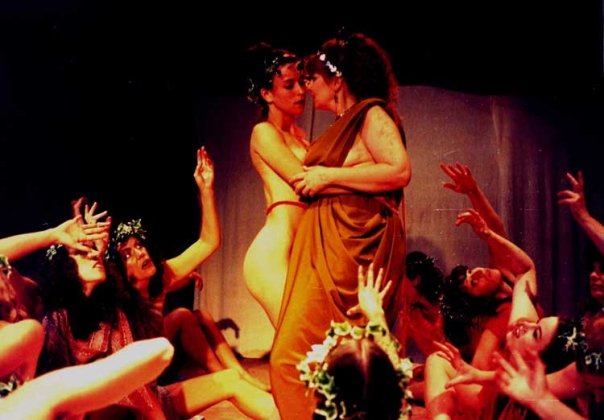
The Bacchae was eventually nominated for three LA Weekly Theatre Awards, for Direction, Musical Score, and Production Design. The productions extensive nudity created quite a stir, which Lorenda (who also appeared onstage as part of the ensemble) addressed in an LA Weekly article: ”I was 40 pounds overweight and terrified at the thought of appearing naked in public. But Brad wanted a broad range of body types, and I agreed. It turned out to be a wonderful experience. Women in the audience responded [to the fact] that I was able to accept myself and be myself onstage. Our objective was to present women as they see themselves, not as men see them. Women are starved for [such] images. Nudity became part and parcel of that . . . It’s not prurient unless it‘s made prurient.“
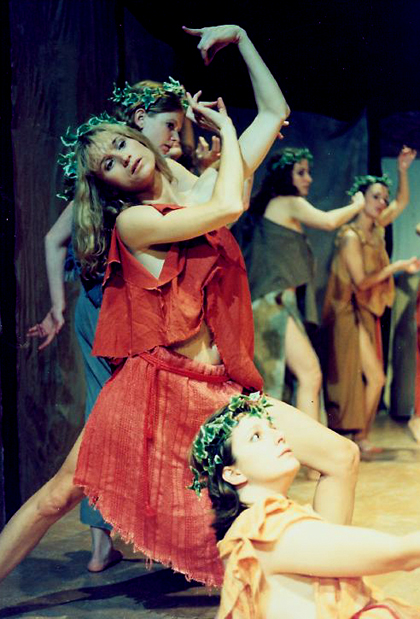
In the wake of the stage production’s success, Lorenda decided that the next logical step would be to adapt The Bacchae into an independent feature film. Since her husband Brad Mays already had one indie feature under his belt, the 1989 comedy Stage Fright which had premiered at the 1989 Berlin International Film Festival, she felt that this wouldn’t be a total stab in the dark and decided, therefore, to trust her instincts. The following year turned out to be a tremendous time of learning as Lorenda made contact with various motion picture production companies, including Lion’s Gate, Samuel Goldwyn Productions, and others. In the end, she struck an agreement with John Morrissey of Turman/Morrisey Productions, and the film was shot in late 2000 in a substantially modified form. The combination of John Morrissey with Lorenda Starfelt and Brad Mays turned out to be an unfortunate one, and the resulting film was wildly uneven.
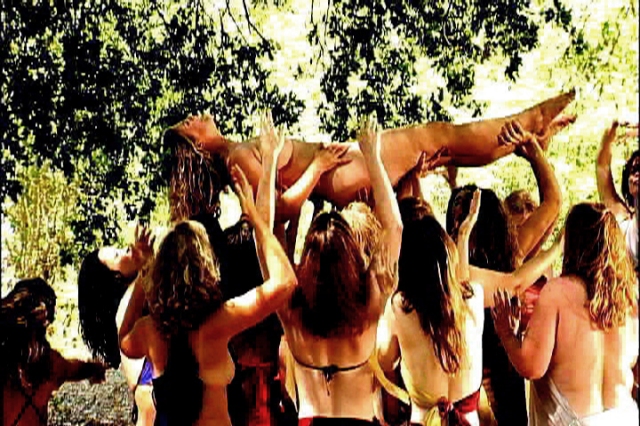
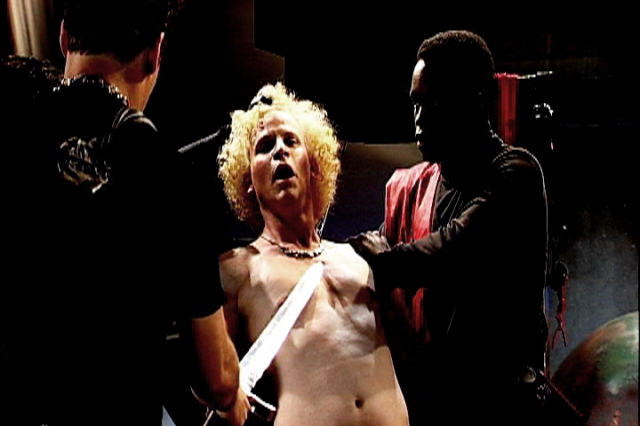
Lorenda Starfelt’s next effort was a theatrical production of the play The Persecution and Assassination of Jean-Paul Marat as Performed by the Inmates of the Asylum of Charenton Under the Direction of the Marquis de Sade for the Los Angeles company Theatre of NOTE. Again, her husband Brad Mays directed. The production ran for six weeks in late 2000 to packed houses and was very favorably reviewed. Unfortunately, after the freedom of an independently produced and cast on The Bacchae, the politically denser atmosphere of an actor-driven company like Theatre of NOTE proved to be bad chemistry for both Starfelt and Mays, who decided to take a breather from Los Angeles theatre.
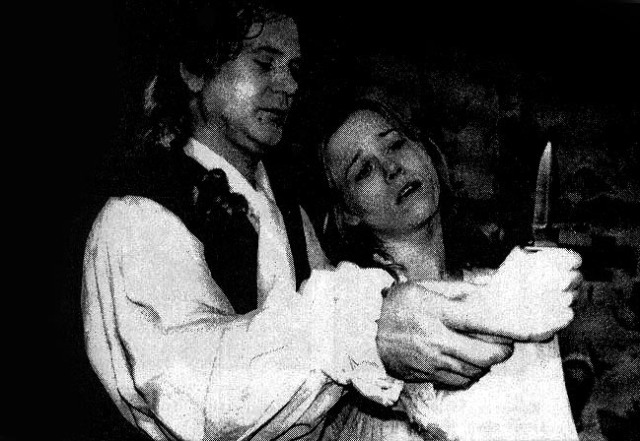
Lorenda’s next producing opportunity came, ironically, with another actor-driven theatre company, the ARK Theatre, whose artistic director Paul Wagar was interested in making a feature film adaptation of ARK’s presentation of The Merchant of Venice, a play Wagar had directed the previous year. Because Wagar had virtually no film experience, and because the didn’t have her husband’s experience to fall back on this time around, Lorenda struggled with the production.
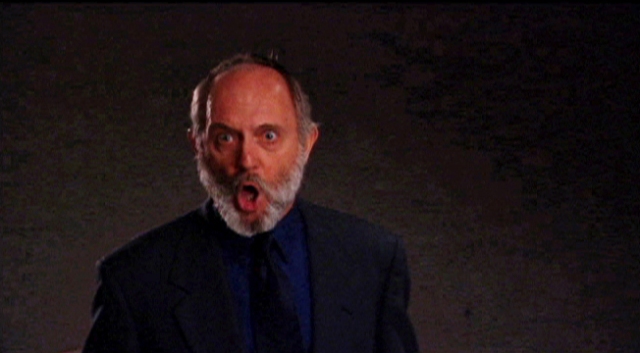
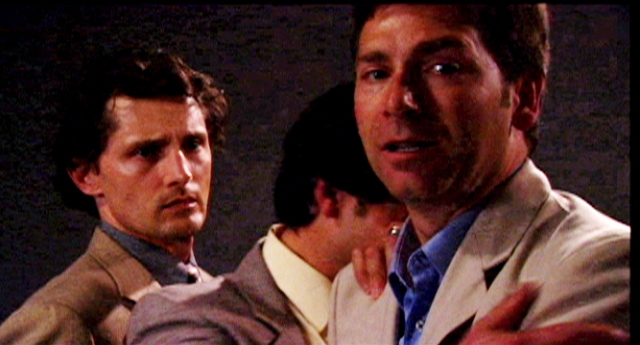
When it looked as if the project might fall by the wayside, husband Brad Mays came on board and got the piece up on its feel. Once this was done, Lorenda deftly guided the three week shoot to its successful completion and eventual release under the title Shakespeare’s Merchant. Having learned a great deal from this experience, she now wanted more. As it happened, the ARK Theatre became home for two more theatrical productions: The Trojan Women by Euripides and Anthony Burgess’ A Clockwork Orange. Although it was the second of the two projects to be performed, A Clockwork Orange was the first to be discussed. The ARK Theatre Company had wanted something different for the 2003 season, and when Brad Mays proposed an original multi-media adaptation of Anthony Burgess’ novel, the company’s artistic director immediately green-lit the production, which would take roughly one year to prepare. When the first scheduled show of the season, ‘Tis Pity She’s A Whore, was withdrawn by its director, Mays was asked if he could put a replacement piece together quickly enough to fill the already paid-for time slot at Los Angeles’ Whitefire Theatre.
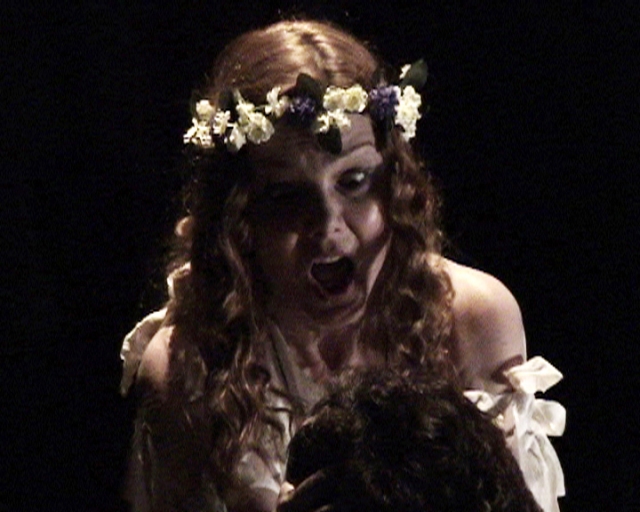
Having recently done a study on the play, Lorenda thought that a production of Euripides’ The Trojan Women might be doable within the time frame allotted, and so rehearsals were quickly organized and begun, under the direction of her husband. The resulting presentation was professionally filmed and edited as a feature-length documentary.
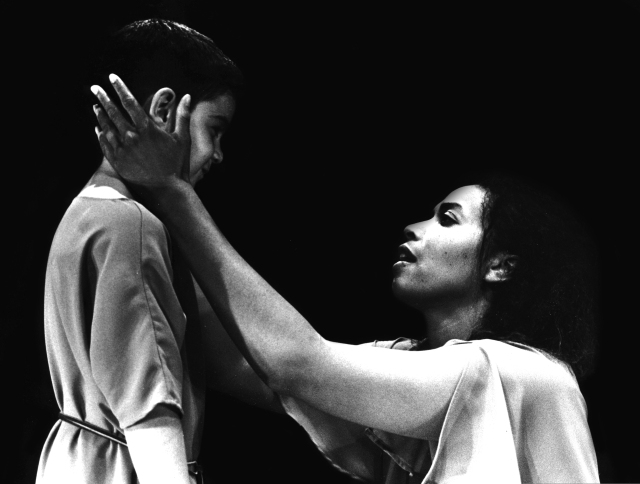
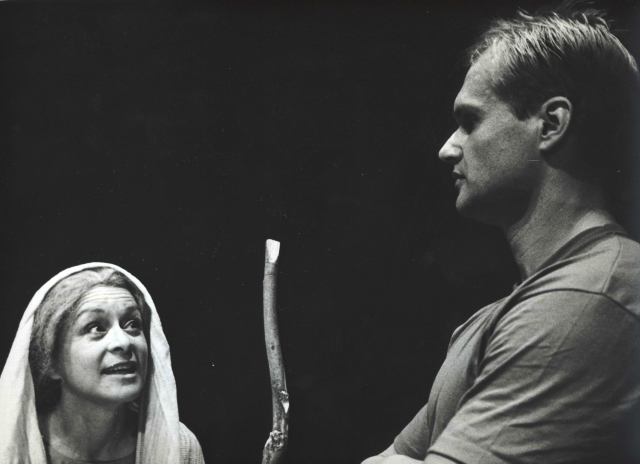
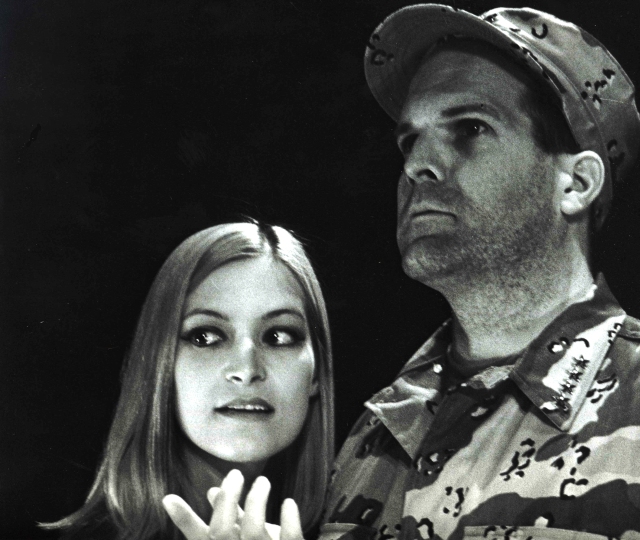
Very shortly after The Trojan Women closed, rehearsals began for A Clockwork Orange. A great admirer of Burgess’ much-acclaimed book, Lorenda was determined that its almost subliminal theme of Christian salvation be present in the theatrical adaptation. She also wanted as little visual referencing to the Stanley Kubrick film – which she also greatly admired – as possible. One thing in particular that Lorenda sought to avoid was the syndrome of having the lead character, Alex, played by a young man obviously older than the 15 year old boy portrayed in the book. In Kubrick’s film, Malcolm McDowell was in his thirties when he took on the role and, brilliant though me may have been, Lorenda felt that the perceived age made a difference in the story’s ultimate impact. Her solution was to cast a young female actor, Vanessa Claire Smith, in the role of Alex. Lorenda had seen Vanessa similarly cast as an adolescent boy in the Carol Churchill play Cloud 9, in which she had performed brilliantly.
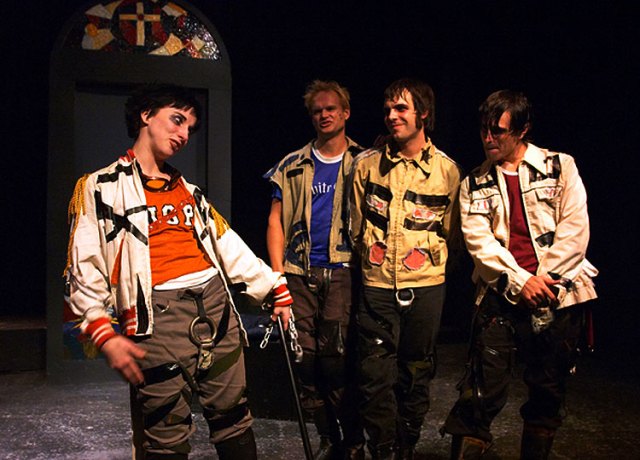
“Vanessa was playing the role of Eddie in Cloud 9 (a boy designated by the playwright to be played by a girl) and she was very, very good,” Lorenda said in an online interview about the production. “She can be androgynous in the way (David) Bowie could be at times….we decided to give it a shot because with a young woman in the role, as opposed to a boy, we could take the stage violence much farther. The rape scene is probably the most brutal scene ever put on stage in legitimate American theatre.”
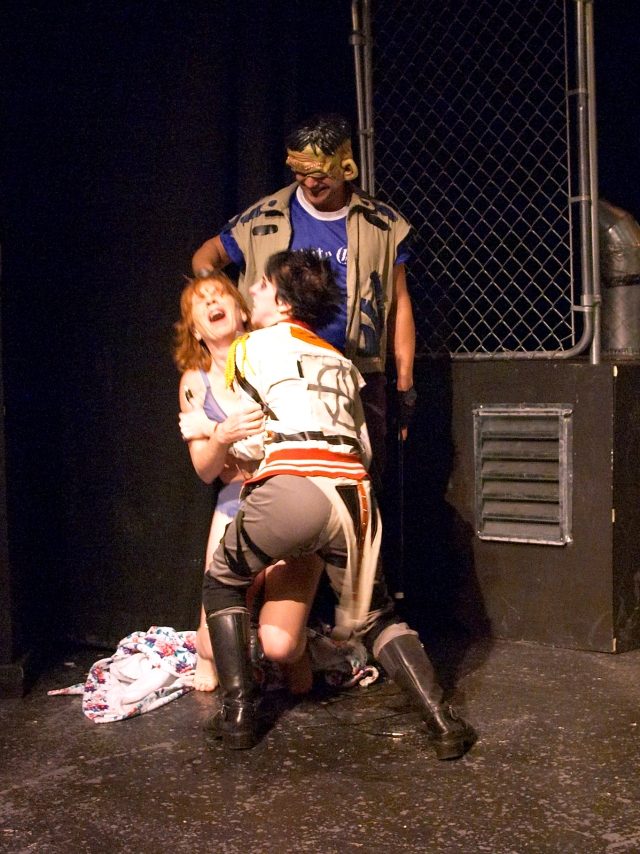
Both Lorenda and Brad were determined to preserve as much of Burgess’ first-person narrative as possible. In most cases, this was fairly simple. Alex could simply turn to the audience and speak directly to them, afterward returning to action at hand. But in scenes requiring full integration of the actor into the narrative environment – such as the scene where Alex is strapped to a chair and forced to watch “correctional” films, all the while screaming and writhing, another delivery device was required. The solution turned out to be simple yet daunting: a previously filmed video stream of Alex talking directly to the camera was shot and projected onto a large video monitor mounted high upstage center, thus enabling Alex to comment directly on the action we were witnessing on stage. A total of seven video monitors were used in the multi-media presentation, projecting a total of three separate though interlocked video and audio streams.
According to the LA Weekly, which awarded the production with their coveted “Pick Of The Week,” the: “visceral, fast-paced multimedia show brings into stark relief the Freudian struggle between the primal self and the civilized self for domination over the human spirit. The director deftly conveys the horror of violence by subjecting the audience to an onslaught of images of war, torture and hardcore porn projected on seven TV screens.”
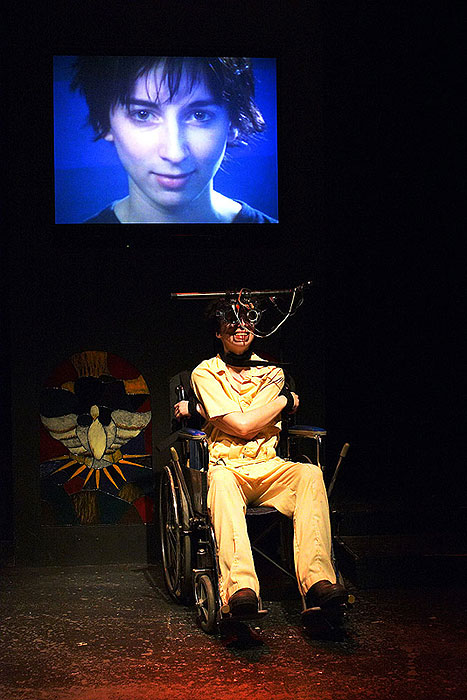
Indeed, the production turned out to be most controversial. The LA Weekly nominated it for three awards: Best Leading Female Performance, Best Revival Production, and Best Direction. As Lorenda had originally predicted, Vanessa Claire Smith won for her stunning portrayal of the teenage sociopath Alex. By contrast, the more conservative Los Angeles Times observed:
“A quartet of thugs in distressed motocross gear circles a wobbly wino, canes and chains at the ready. After some obligatory grunting and scraping, the Carl Orff blares and the pulled-punch pummeling begins. Are we having fun yet? So goes director Brad Mays’ new staging of “A Clockwork Orange,” in which dubious taste and lame fight choreography grapple with portentous cliches and wildly variable acting styles.”
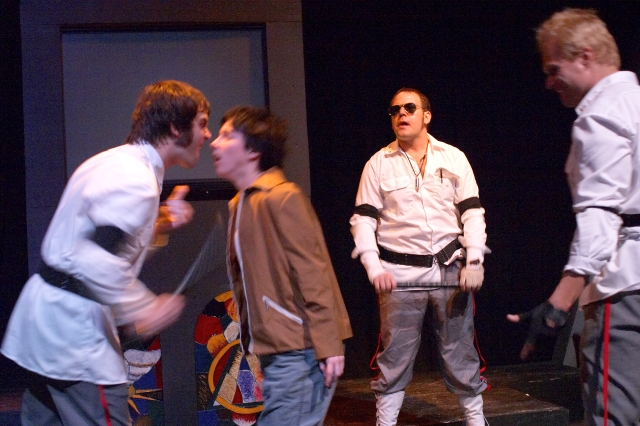
The experience of doing A Clockwork Orange and The Trojan Women at yet another actor-driven theater company proved to be unpleasant for both Lorenda and her husband, so much so that they resolved to focus their energies exclusively on film projects and forgo stage work altogether, at least for the foreseeable future. The next several years saw a series of beginnings and setbacks, one of which let Brad to hang out his shingle as a film editor. This proved to be a very good move, as it put Lorenda and himself into some completely new professional circles, while at the same time adding to their resumes. In 2006, a first-time director named Brooks Elms asked Lorenda to co-produce his feature drama Schooled from a script he had written about his own experiences in alternative education. Lorenda worked very hard on the project, which gave her the very valuable opportunity of collaborating with a director other than her husband. Another very helpful break came in the summer of 2006, when the couple was hired to put together a feature-length documentary film about the world-renowned OperaWorks training program for classical singers. This time around, Lorenda and Brad became a production crew of two, lugging a Canon XL-1 and a Canon XL-2 around the Cal State Northridge campus in record-breaking summer heat.
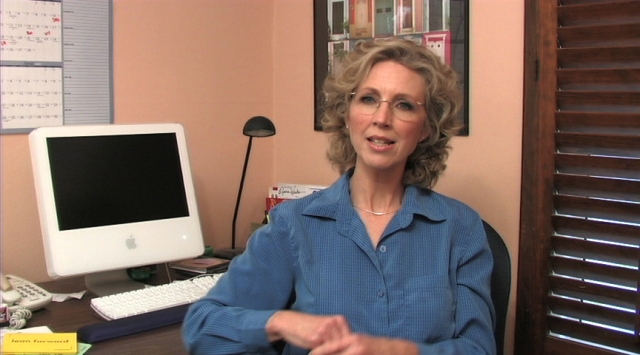
“We went to work together shooting,” Lorenda later wrote. “It was a blazing hot summer, and we were toting 60 pounds of equipment across Cal State Northridge in the 113 degree heat. We learned a great deal about planning and shooting from that experience but we also learned an enormous amount from the program and what Ann’s teachers were teaching as well. And all of that (eventually) went into The Watermelon. “
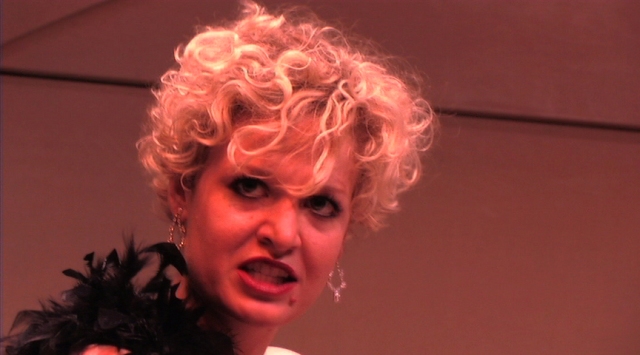
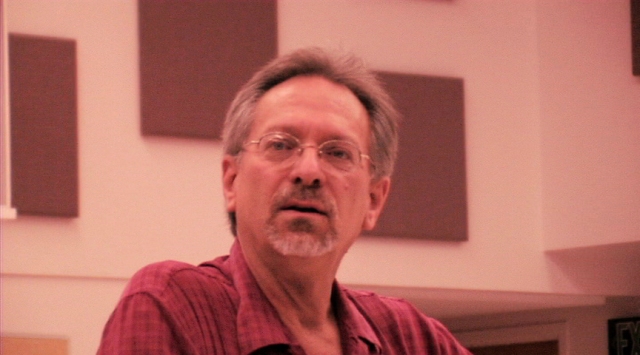
In all, over 200 hours of footage was shot during that summer covering a multitude of topics. The finished film was entitled SING*ularity, from Shakespeare’s line from the comedy Twelfth Night: “put thyself into the trick of singularity.”
During that summer, Lorenda decided that it was time to put together another indie feature, but this time as the sole producer, in order to maintain artistic control. She took out an ad on Craigslist, and the very replay was from an established writer name Michael Hemmingson.
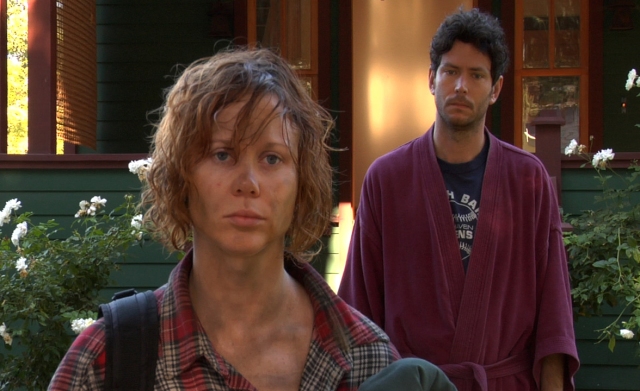
“The Watermelon was the first script I read when I went looking for a project,” Lorenda later wrote. “It was perfect – very few locations, a handful of beautifully written characters, a whimsical story and superb dialogue. The first page had a sight gag that made me laugh out loud at my desk. I went on to read maybe 150 more scripts but nothing else came close in either charm or do-ability. It also had roles for Kiersten Morgan and Elyse Ashton – two actresses that Brad and I both knew we wanted to work with.”
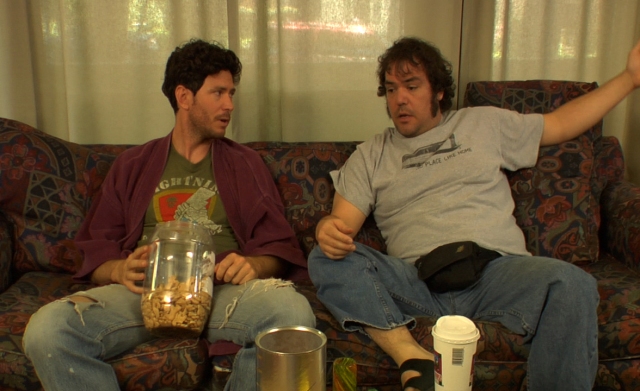
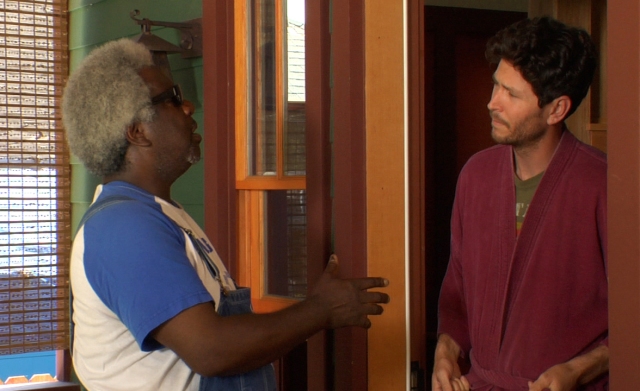
Lorenda showed the script to Brad, and he agreed with her notion that the Hemmingson story could be shot quickly, cheaply, and had sufficient narrative and character strength to hold an audience. Raising the money took over a year, with many ups and downs, but in July of 2007 the project went into production
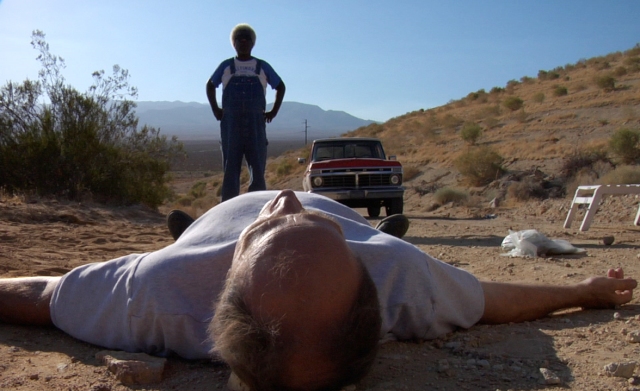
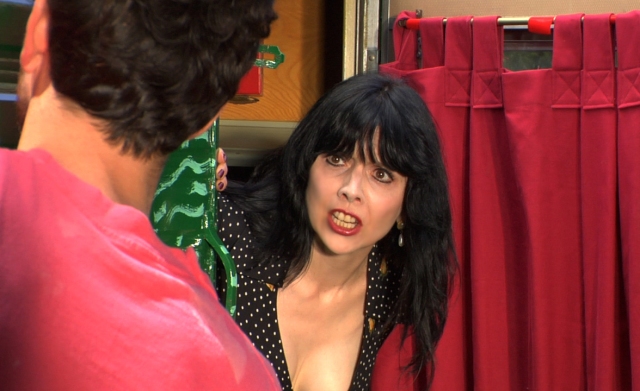
“I met Larry, our director of photography, at another shoot and knew that I wanted him to light the movie,” Lorenda wrote in her Myspace blog. “He was perfect and he and Brad made a first rate team. He brought his crew along, and we shot like clockwork. I can honestly say that movie is as much mine as it is Brad’s and for the first time, when I see my name in the credits, I’m proud of the work I did. All the lessons we learned in other projects – how to cast, how to relate to the cast, avoiding narcissistic personality types, using a strong script to attract production crew that would normally be beyond the project’s budget, where to get the best buys on stuff – all that went into The Watermelon. It’s very satisfying.”
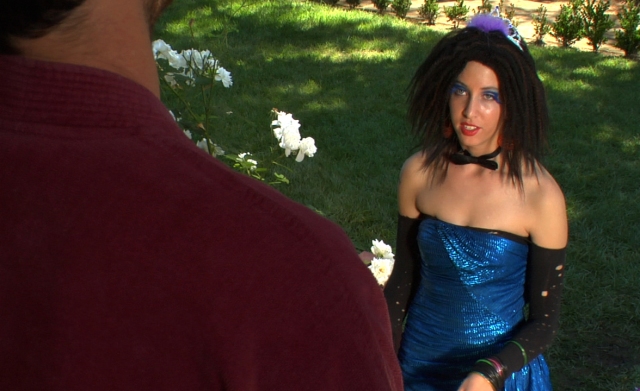
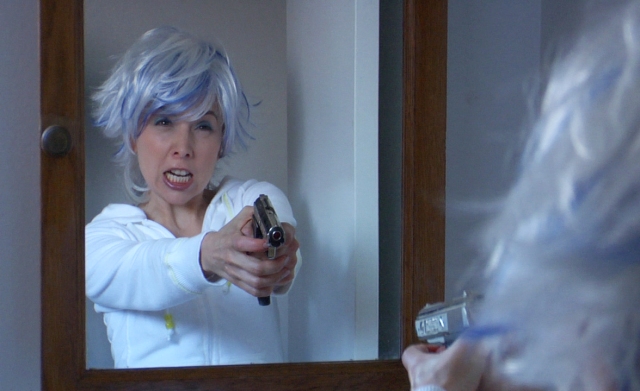
The bulk of the film was shot in July, with addition scenes shot in August and early September. The atmosphere was, for the most part, very upbeat and happy. Lorenda was quite hands-on, especially when it came to company morale, handing out strawberries and Hershey’s Kisses to the cast and crew. Editing took the better part of a year. Peter Girrard, the composer for Lorenda’s 1997 stage production of The Bacchae, was hired to do the musical score. Additional music was provided by Berrington Van Campen, who also produced and recorded a faithful remake of the Patsy Cline recording Crazy, with Lorenda’s cousin Jessie Magnuson performing the vocal. The Watermelon made its world premiere at the San Diego Film Festival in September of 2008, and by the following July, was in national distribution. The film eventually went on to receive the California Film Awards “Diamond Award” in January of 2011.
THE WATERMELON – Teaser – Streaming Video
In the summer of 2008, Lorenda became involved in what was to become the feature-length political documentary The Audacity of Democracy, which followed the 2008 race for the Democratic Presidential nomination and focused in particular on the PUMA organization. Shot from June through September 2008, Lorenda and Brad filmed interviews and political activity taking place in Los Angeles, Princeton, Dallas, Austin, Washington, D.C., Chicago, New York City and, ultimately, at the 2008 Democratic National Convention in Denver, Colorado.
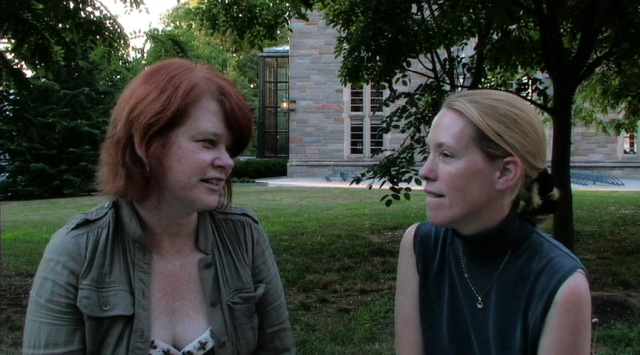

The couple came under almost immediate fire from pro-Obama groups, who cited conflict of interest due to the production having been financed by PUMA-Pac itself. Both Lorenda and Brad acknowledged these concerns, while maintaining that the film would be an objective account of what they saw and heard during the Democratic primary. When Brad decided to film interviews with Internet journalist Tommy Christopher, an outspoken PUMA critic, the rank and file of the PUMA movement quickly denounced the filmmakers, distancing themselves from the entire project.
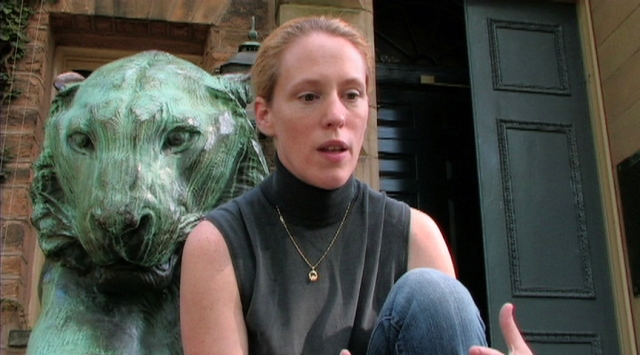
“In the Audacity of Democracy,” Lorenda wrote in 2009, “I define bigoted language as language that relies on demeaning cultural stereotypes for its punch. One of the things that went badly wrong in the primary is that no one with a big enough megaphone to provoke a cultural discussion defined bigoted language. As a result, it became a matter of opinion whether something was sexist or racist. In point of fact, there are objective standards available to define these things.”
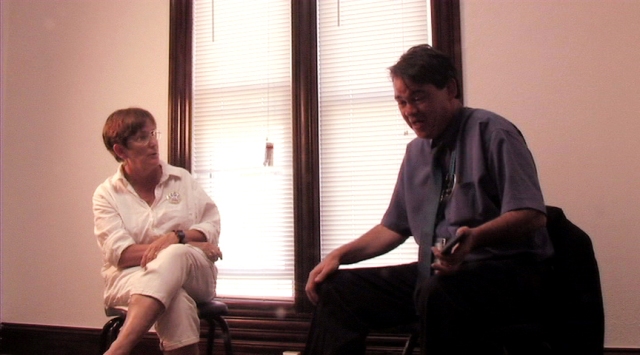
The Audacity of Democracy was hard on Lorenda and Brad, both as individuals and as a couple. There were numerous arguments in Dallas, and while Brad was en route from Washington D.C. to Chicago, all of their camera and sound equipment was stolen, leaving the Chicago shoot pretty much a bust. Lorenda deeply resented Brad’s inclusion of footage pertaining to journalist Tommy Christopher, an outspoken critic of the pro-Hillary Clinton PUMA movement. Indeed, when the film was eventually released, in January of 2009, the larger PUMA movement itself quietly though very palpably shut down any and all discussion of the film, which contained some very unflattering scenes. Once again, Lorenda began searching for another dramatic feature to produce. In the end, she decided to write her own story and produce that. Lorenda’s love of music, combined with her passion for the cultural achievements of women young and old, ultimately led to the creation of Beginning Blue, the story of an all-girl rock band striving to follow in the footsteps of such greats as the Beatles, the Band, the Kinks, Traffic, Blind Faith and Joni Mitchell. The characters she created for this project are very young – high school age – and extremely talented, even visionary. They aren’t obsessed with mainstream trends, fashions, or platitudes; they live only for music.
While Brad was at work on a number of outside film projects (for which Lorenda assisted and advised him on a daily basis), Lorenda worked at her own pace on the story and characters of Beginning Blue. Her own thoughts about the Holly wood system of script development are striking and very uniquely her own: “I’ve spent the past several years producing low budget features,” she wrote in an online film room discussion. “I’ve produced everything from an adaptation of Euripides’ The Bacchae to a metaphysical comedy about a guy who inherits a travel trailer painted like a watermelon – with documentary side-trips from opera to this year’s Democratic primary. I’ve learned a lot of valuable lessons including that you must love what you’re shooting. I can handle everything from breakdowns to camera work to post-production. I’m opposed to the notion of (script) development and think filmmakers should tell the story pretty much as written or find a better script. So there.”
In the summer of 2010, while producing Featherweight, a web series pilot about a female boxer, Lorenda began to feel ill. She eventually underwent a series of tests and was told that she had cancer of the uterus, a fact that she kept from both Brad and her son Graham. Subsequent surgery revealed that the cancer had spread to Lorenda’s abdominal cavity. Even worse, the cancer itself turned out to be sarcoma, the rare and highly aggressive strain that had, a year before, killed Kate McGarrigal, one of Lorenda’s favorite rock singer/composers. While undergoing various treatments, Lorenda took on co-producing duties of a new comedy web series entitled Customer Diss-Service with friends Ronald M. Williams and Scott Weisenfeld. Brad Mays directed two seasons of the series, which was well received by audiences.
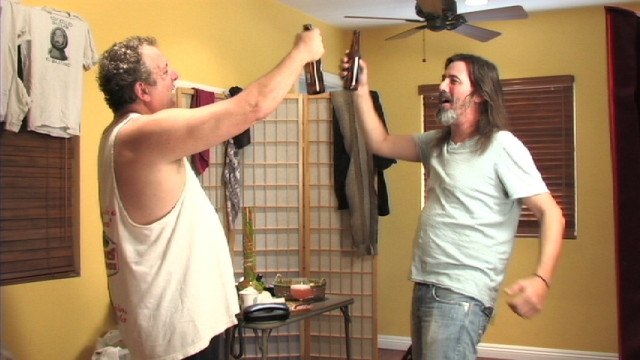
A large birthday party was thrown for Lorenda in January of 2011, and for one final time she was surrounded by family and friends both old and new. In mid-Februrary, Lorenda’s condition took a sharp turn for the worse and on March 16, 2011, she passed on. Incredibly, the last words Lorenda spoke to her husband and son were about her film Beginning Blue which, as of March of 2014, is in the fund-rasing stages.
Since her untimely death, two film projects in which Ms. Starfelt had direct involvement have come to fruition. The first, a very funny comedy short The Donut Shop – written & produced by, and starring Theo Ogunyode (and directed by Brad Mays) – won the “Best Comedy Award” at the 2012 San Diego Black Film Festical, and the “People’s Choice Award” at the 2012 San Fransisco Black Film Festival. The second film, the documentary feature I Grew Up In Princeton, begun in 2008 and finished in 2013, was produced by Ms. Starfelt and directed by Brad Mays. The film had its premiere in Princeton, New Jersey on October 18, 2013 and, as of this writing, is playing the international film festival circuit.
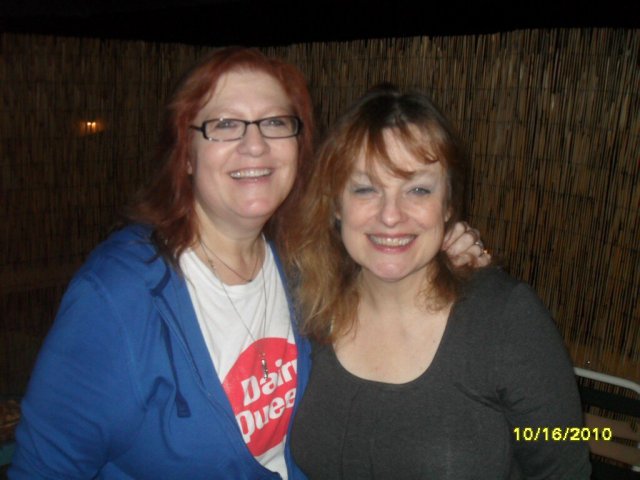
“Mom. Wife. Filmmaker. Dog lover. Happy. What else is there?”
Lorenda Starfelt, 2010.
For more information, see the Wikipedia article on Lorenda Starfelt at:
or her IMDB page at:
http://www.imdb.com/name/nm0823092/
© Copyright 2011
All Rights Reserved

Sad but curious that Ms Starfelt died at such a young age. She had such a profound impact on the world.